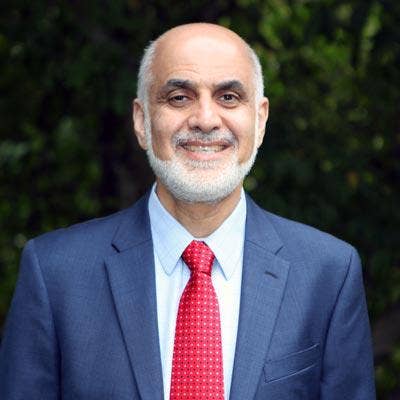Advanced Computer Concepts President On Navigating 'Complex' Vendor Relationships And The Huge Opportunity In Networking

On The Record
At McLean, Va.-based Advanced Computer Concepts (ACC), No. 128 on CRN's Solution Provider 500, President Reza Zarafshar said his company is fired up to continue its pursuit of the networking solutions market this year. "Demand for data and the amount of the data that we need to run through our pipes is not going down," Zarafshar said. "And that in itself requires constant re-engineering of certain networks." The bullish stance on networking comes even as ACC, a Cisco Gold partner and CRN Triple Crown winner, remains in a research phase on software-defined networking, he said.
In an interview with CRN, Zarafshar discussed where ACC is looking to add vendor partnerships, what the 50-person firm seeks in a channel program and why navigating relationships with vendors is often the "hardest thing" about running a solution provider company.
What follows is a portion of Zarafshar's recent conversation with CRN.

What does it mean to be a "total solution provider," as you describe Advanced Computer Concepts?
Our interest is trying to make sure we meet the needs of the customer in the best way possible. And if we have the capability to help the customer, we consider that our top priority. And if we don't have the capability to help the customer, we feel it's our responsibility to bring in partners that are the best of breed -- whether they're manufacturing partners or other solution providers who can do a part of that project for the customer in the best way possible. So we take the customer's position and customer's need as the most important element in our go-to-market strategy.

What are your differentiators?
As a small company, we feel our ability to execute and be agile enough to meet the customer's requirements is the most important thing. If you walk into a customer and start telling them about how our processes are going to be imposed on them, it's not necessarily a good way to start a conversation. Customers demand flexibility from us, and because of the fact that we are a small company and very agile, we meet that requirement in the best way possible.

What are your priorities for 2018? Where are you investing?
Our priorities are to expand both in the government and corporate customer base of ours. Half of our business is corporate, and the other half is government -- both federal and SLED markets. So our interest is to expand our business in both of those areas. In the government, obviously, we're trying to gain more mindshare with GWACs and various contracts that are available out there. And, in corporate, by going and seeking customers for whom we can solve problems.

Are there certain technology areas or certain types of solutions that are proving to be most profitable?
Our focus in the company in terms of technology, the highest focus, is networking. Anything related to networking we feel is our major expertise, and we spend a tremendous amount of money and effort in expanding our capability in that area. One of the most important feathers in our cap, if you will, is our relationship with Cisco. We have a Cisco Gold status that is very important to us. And that has been a major enabler in being able to gain a wider market share for our company.

What makes networking such a good area for you?
It's an area where the expanding never ends. It constantly requires training, additional understanding. And all of that means, as far as we're concerned, an opportunity to go and tell our customers about solutions that will help them run a better business. That's No. 1. No. 2 is that demand for data, and the amount of the data that we need to run through our pipes, is not going down. And that in itself requires constant re-engineering of certain networks. And for us, that is an opportunity that we like to go after. And with the kind of channel programs that Cisco has put in place, for us, it's a perfect solution.

How much are you doing in the area of software-defined networking?
SDN has not been a major game changer for us yet. When I say "yet," I mean that's an area that we are trying to understand just how it can help the customer and be of value to the customer. Technology is good, technology is wonderful, but if it doesn't provide value to the customer it's just a great technology. So our interest is trying to better understand how it can be of value to the customer, and what it can do for the customer that traditional networking has not been able to do. It's an area of R&D for us.

Are you looking to add vendor partnerships this year?
We are very interested in adding some niche solutions in security and expand our capabilities in the area of storage. Those are some of the areas that we feel that we should spend time and effort for this year. The security landscape is in a constant change, so a security solution that may have worked two or three years ago may not necessarily work for some customers today. In the interest of the customer, we are constantly looking for the best-of-breed solutions that can meet today's security threats.
What are some indicators that a vendor has a great channel program?
No. 1 -- and I speak as a company that is quite small in terms of the size of solution providers -- there are some vendor programs that when you look at them, you see right away that it is geared to support the very, very largest of solution providers. That is not a bad thing, but it is an approach that does not work for us. We like vendor partner programs that allow us to make investments in their solution, in education, in their product line, so that based on our investments they determine our medal levels. A medal level that is based on volume of business that you bring in does not necessarily work for a smaller company from the get-go. It works later on, but you can imagine some of the multi-billion-dollar solution providers meet those requirements on day one. A small business like us won't meet that right away, and that puts us at a disadvantage.

Are there other indicators you look for in a channel program?
The second thing is, obviously, we look at what kind of support are they willing to provide to expand the business for both them and us. I'm not necessarily looking for them to be worried about my profitability. We will make this business profitable. What I don't want is for them to create an artificially small channel to make us profitable. That does not necessarily help the business in the long run. It may help it in the short run, and it may be good for a very, very niche solution. But if we're looking at commodity products -- and most products become commodity after a certain amount of time -- creating artificial barriers to commerce is not necessarily a good channel program.

What do you think is the biggest mistake the solution providers are making right now?
I think the biggest issue is not living up to the realities of newer solutions and technology changes that are taking place. The rate of change in the technology business is much faster than in most other businesses. We, as solution providers, have to understand that and adjust our ways of doing business based on that reality. So the way we ran this business 36 years ago when we started is quite different than the way we run it now, and it's going to be quite different a year or two from now. And if we are not happy about change, we're not going to be able to be the best solution providers to our customers. We have to be realistic -- our customers are in the business of health care, our customers are in the business of providing legal services, manufacturing. Their interests are not chasing technology. Their interests are for us to come in and give them the tools so they can do the best of what they do for their own business. And if we don't keep up with the technology changes, and adjust our business based on that, we're not answering our customers' demands.

What's an example of something that you've changed from a year or two ago?
Cloud has been going on for more than two years, but certainly, that has been an area that has impacted our thinking and our approach and support of our customers. That's one of the major ones. We had to understand the reality that not every customer wants us to come in with a truckload of hardware and drop it in their data center. For some customers that may be a perfectly fine solution, and for some customers that may not necessarily be the best solution. Coming up with solutions that move some of their apps and some of their requirements to the cloud may be a better way of doing it. We're not saying cloud is a solution for everybody. So it's about understanding the customer's specific requirements and pain points and finding the best way of helping them -- and the way that's cost-effective, too.

How have you gone about building a brand? Is digital marketing a part of your brand-building efforts?
That's a very excellent question, and I don't feel I have a very good answer for it. Marketing used to be [that] you'd put an ad in a local newspaper. Now, who reads a newspaper? Trying to find a marketing strategy, especially for a company our size, is not a very easy task. So, how many websites do you put banner ads on? Is 1,000 enough, or should I use 10,000?
We feel that by looking at the vertical markets that we want to approach, and showing up where those verticals may show up -- such as trade shows and stuff like that -- gives us a better bang for our buck on marketing than trying to do digital marketing. It's a very crowded and undefined environment in digital marketing.

What are the hardest things about running a solution provider company in 2018?
I feel that the hardest thing is working in a positive way with most of the vendors, and determining the best way to work with the vendors. That is really the difficult thing. We can go and find customers, build a brand, support our customers -- but if we don't have the support of the vendor behind us, it means nothing. I could have half the city here be my customers, and one of the big OEMs says, "We don't want to have anything to do with you." I've got nothing. I don't want to sound negative about it -- it's something that we have to put effort into, and understand it's not just calling up an OEM and saying, "We want to carry your products." But working with those OEMs is really the most complex part.

What in particular makes working with vendors so complicated?
We are all in the sales business. And which salesperson do you know who doesn't want to have the big accounts of the major telecommunications company in the country, or the major airline of the country, or the major software company of the country? So [if I'm] in the OEM business, I just put all my effort and time and energy into this $20 billion solutions provider, I've got enough business to keep me happy. I don't want anymore, I don't want to deal with anybody else. That mentality is something that requires some complex thinking to maneuver around. I'm not trying to say it's bad, I'm just saying that's the reality and you've got to deal with that reality.